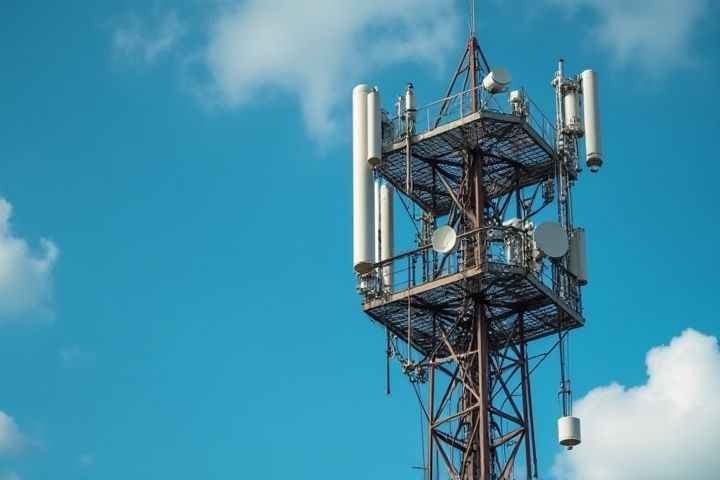
Telecommunications in Nigeria has experienced significant growth, with major players like MTN Nigeria, Airtel, and Glo competing for market share. The National Communication Commission (NCC) regulates the sector, ensuring compliance and fostering competition. As of 2023, mobile phone penetration in Nigeria exceeded 85%, making it one of the largest telecom markets in Africa. Innovations such as mobile banking and internet services have transformed everyday life for millions of Nigerians, enhancing access to information and financial services. You can leverage these advancements for improved connectivity, whether for personal use or business development.
Mobile penetration rate
Telecommunications in Nigeria has experienced significant growth, with the mobile penetration rate reaching approximately 85% as of 2023. This high penetration rate illustrates the increasing accessibility of mobile services, driving connectivity in urban and rural areas alike. Major telecom companies, including MTN, Airtel, and Glo, contribute to this expansion by enhancing network infrastructure and offering competitive pricing. The rise in mobile usage has not only facilitated communication but has also spurred economic development through mobile banking and e-commerce innovations.
Leading telecom operators
Telecommunications in Nigeria feature prominent telecom operators such as MTN Nigeria, GLO, Airtel, and 9mobile, each significantly contributing to the country's connectivity landscape. MTN Nigeria holds the largest market share, providing extensive 4G LTE coverage and diverse mobile services, while GLO offers competitive data plans and innovative solutions tailored for local needs. Airtel emphasizes customer service and network reliability, catering to both urban and rural areas, while 9mobile focuses on delivering affordable voice and data packages. This competitive environment fosters continuous advancements in technology and customer experience, shaping Nigeria's digital future.
Regulatory authority (NCC)
The Nigerian Communications Commission (NCC) serves as the regulatory authority overseeing the telecommunications sector in Nigeria, ensuring compliance with national policies and international standards. Established in 1993, the NCC is responsible for promoting competition, protecting consumer rights, and guiding the growth of the telecom industry through licensing and regulation. The Commission also plays a vital role in implementing policies that foster innovation and infrastructural development across the country. With initiatives aimed at improving network quality and expanding access to telecommunications services, the NCC is crucial in bridging the digital divide in Nigeria.
Internet subscriptions
Telecommunications in Nigeria has seen a significant surge in internet subscriptions, driven by the increasing accessibility of mobile devices and data services. As of 2023, the number of broadband internet users has risen sharply, with telecom companies investing heavily in infrastructure to meet the growing demand. Major providers like MTN, Airtel, and Glo are leading the charge, offering innovative data packages and competitive pricing to attract more customers. This growing connectivity is enhancing digital literacy and boosting economic opportunities across various sectors in Nigeria.
Broadband access
Telecommunications in Nigeria emphasizes expanding broadband access to enhance connectivity across urban and rural areas. This initiative aims to bridge the digital divide, fostering economic growth by enabling businesses and individuals to access online resources and services. Key players in the industry are investing in infrastructure development, including fiber optic networks and satellite technology, to provide reliable internet services. By improving broadband penetration, Nigeria can support innovation, education, and digital inclusion, allowing you to better engage with the global economy.
Digital transformation initiatives
Telecommunications in Nigeria is increasingly prioritizing digital transformation initiatives to enhance connectivity and service delivery. This shift aims to improve access to mobile internet, facilitate e-governance, and promote innovation within various sectors, including education and healthcare. Global technology partnerships are integral to these initiatives, driving the adoption of cutting-edge solutions such as 5G networks and cloud computing. By embracing digital transformation, you can benefit from a more efficient communication landscape that supports economic growth and societal advancement.
5G network deployment
Telecommunications Nigeria is dedicated to advancing 5G network deployment across the nation, enhancing digital connectivity and infrastructure. This cutting-edge technology promises significantly faster internet speeds, lower latency, and improved reliability, enabling seamless communication and data transfer for users. With increased capacity, 5G supports various applications, including smart cities, Internet of Things (IoT) devices, and telemedicine. By investing in this transformative network, Telecommunications Nigeria aims to propel economic growth and innovation, positioning the country as a leader in the digital landscape.
Infrastructure challenges
Telecommunications in Nigeria faces significant infrastructure challenges, including inadequate network coverage, limited fiber optic cable deployment, and unreliable power supply. Major urban areas often experience congestion and dropped calls due to insufficient base station infrastructure, while rural regions remain underserved. The high cost of deploying new technologies and maintaining existing networks presents further obstacles for operators. Addressing these issues is crucial for improving connectivity and supporting the rapid growth of mobile and internet services in Nigeria.
Rural connectivity efforts
Telecommunications Nigeria is dedicated to enhancing rural connectivity by deploying advanced infrastructure, such as fiber optic cables and satellite technologies, ensuring that remote areas gain reliable internet access. This initiative not only bridges the digital divide but also supports economic growth by enabling local businesses to access global markets. Community engagement plays a crucial role, with training programs aimed at empowering residents with digital skills. As you explore these opportunities, consider the transformative impact of technology on education, healthcare, and communication in underserved communities.
Mobile money services
Telecommunications in Nigeria has increasingly pivoted toward mobile money services, revolutionizing the financial landscape for millions. Platforms like Paga and Flutterwave enable secure transactions, facilitating seamless payments, transfers, and bill settlements directly from mobile devices. This surge in mobile financial solutions supports financial inclusion, empowering individuals and small businesses to access essential banking services without requiring a traditional bank account. With a growing smartphone penetration rate, mobile money is becoming an indispensable tool for economic growth and digital transformation in Nigeria.
